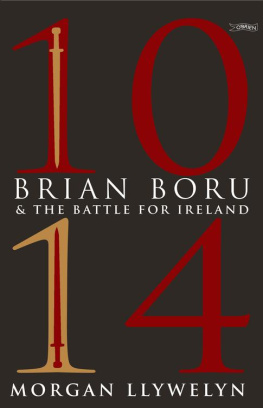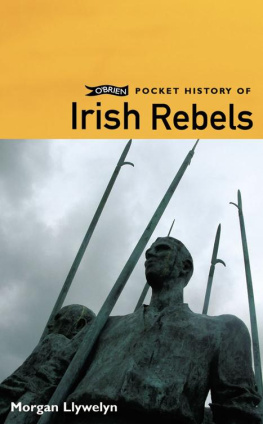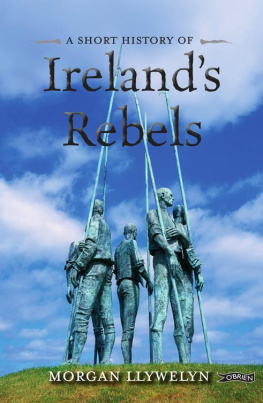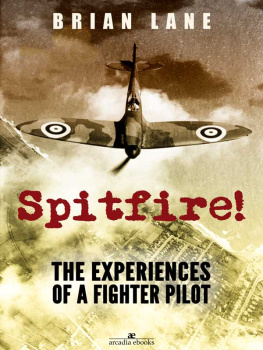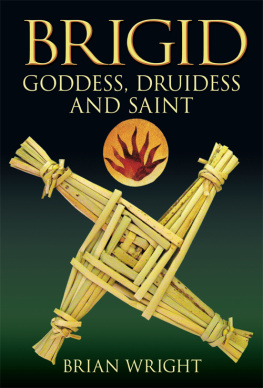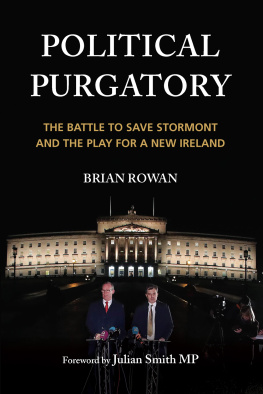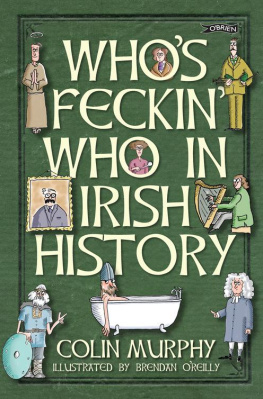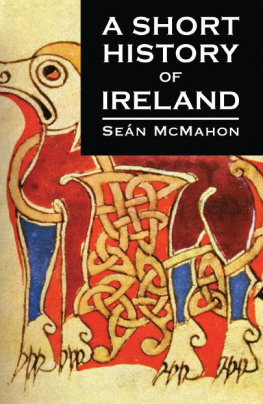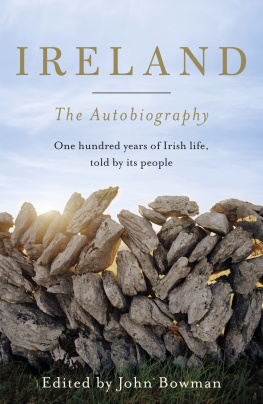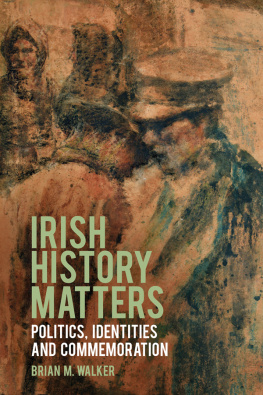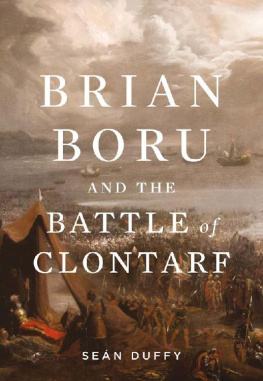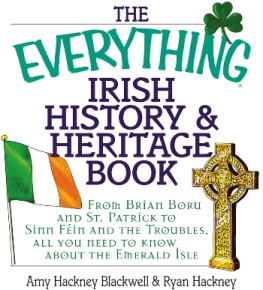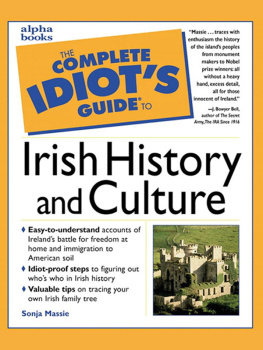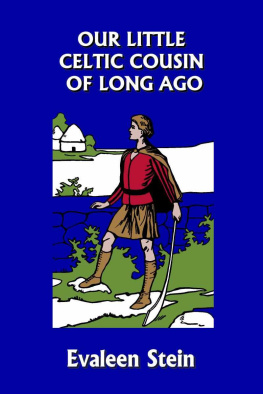M organ Llywelyn, one of the worlds most successful and respected historical novelists writing about Ireland and the Celtic culture, has departed from fiction to present a factual history of one of Irelands milestone events.
1014: The Battle of Clontarf, is one of the first dates that an Irish child learns in school. 1014 is as significant for Ireland as 1066 and the Battle of Hastings were for the English. In this groundbreaking book published in 2014, its millennium year, Llywelyn employs her unique skills to bring the Battle of Clontarf to life once more. She offers not just a recitation of the names and dates but a vivid glimpse into the past in all its dramatic and bloody reality. She has an uncanny knack of carrying the reader back through time and a deep, almost intuitive understanding of ancient Ireland.
Llywelyns approach to the Battle of Clontarf takes a fresh look at the generally accepted accounts which have been written and re-written over the centuries. Scholars and historians continue to argue over who was there and what happened that day. Llywelyn is not afraid to widen the posts of historical interpretation and possibilities. Nor is she reluctant to seek out the answers others have overlooked. The result is an historical account to stand with Cecil Woodham-Smiths The Reason Why about the Charge of the Light Brigade.
The authors intensive study of Brian Boru began with research for her international bestseller Lion of Ireland, and has continued ever since, focusing on the character of Irelands greatest high king as demonstrated through his actions. Drawing upon her unique understanding of Brian, now Llywelyn has produced an authentic portrait of the man who worked so hard to assure Ireland of lasting peace and prosperity until the triumph and tragedy of 1014.
As a direct descendant of Brian Boru and Chief of the Name, I believe we OBriens are lucky indeed to have Morgan Llywelyn as our modern day bard.
B rian Boru is a prominent figure in the histories of early medieval Ireland, yet when my historical novel, Lion of Ireland, was first published in 1980 there was no other book in print about Irelands most famous high king. No biography of him existed. Some of the people with whom I discussed the project in the beginning assured me that Brian was a fictional hero from Celtic folklore, like Cchulainn or Fionn mac Cumhaill. There could have been no such person because Irish historical heroes were always failures. Everyone knew that, they said. And even if someone of that name had existed, nothing was known about him. They said.
They were wrong on both counts. Brian Boru was a real person. Determined research uncovered enough information to construct a novel around him, though I did not stop there.
SOURCES
The known facts about Brian are contained within several Irish annals compiled contemporaneously with or shortly after his life, as well as a few Norse texts. All of the subsequent accounts over the centuries have been taken from this material and reworked according to the opinions and prejudices of the writers and historians involved. These have provided an endless source of controversy and will continue to do so into the far future.
Since Lion of Ireland became an international bestseller, numerous writers and scholars as well as film makers have rediscovered Brian and wanted to retell his story. All face the same problem I did: when it comes to documentation there are only the archaic records to draw upon, and those can be contradictory and confusing. Beyond them everything is and must be speculation, conjecture, and educated guesswork.
My continuing interest in the character and career of Brian Boru has resulted in the collection of a sizeable library devoted to him and the world he inhabited (see the partial bibliography at the end of the book). In 1983 Roger Chatterton Newman published the first nonfiction biography of Brian, Brian Boru, King of Ireland. And 1990 saw the publication of my book for young readers entitled Brian Boru, Emperor of the Irish, which won the Bisto Award for Excellence. As we approach the thousandth anniversary of Brians greatest battle, it seems appropriate to revisit Clontarf and make an effort to understand what really happened on Good Friday, 1014. The foreign invaders combined with the rebel Irish had superior numbers and weaponry, yet Brian Boru won. The great question is how?
Writing an accessible non-fiction history of the Battle of Clontarf was a challenge. In 1986-87 I had published Xerxes, a biography of the Persian warrior-king commissioned by City College of New York, and was familiar with the task of reconstructing ancient battles. To set the events of 1014 in context required a condensed outline of the socio-political situation of Ireland in the late ninth century and a re-examination of the known facts.
But more was necessary to open up this story to a wider audience. Both historians and biographers employ speculation to address gaps left in the fabric of the distant past. As a historian I have great respect for the facts; as a novelist I appreciate the drama and sense of immediacy that fiction can produce. No fact or incident has been invented in this book, but if their history is to be more than dry bones the people involved needed to be given flesh and blood, and have some of the small details of their everyday lives brought to light. The techniques of a novelist have been employed to set scene and atmosphere . The best-known legends surrounding Brian and the battle have been included because they are such an integral part of the whole. Still, there is so much we cannot really know, including the motives and emotions of the men and women who lived a thousand years ago. These are the elements which allow the greatest latitude for conjecture; humans are always the most intriguing.
Three things are certain: Brian Boru actually lived. A great battle took place in 1014. And Ireland won.
* * *
I wish to thank amonn de Burca of de Burcas Rare Books for helping me on the initial, sometimes frustrating search for material about Brian Borus Ireland. Without amonns guidance I would never have located some of the more obscure works now in my personal collection. The late Cornelius Howard of the Department of Foreign Affairs introduced me to the owners of private libraries, here and abroad, who let me study rare manuscripts that were not available to the public. Professor George Meier, then head of the Department of Celtic Studies in Georgetown University, Washington, D.C. gave me access to important material which had long since left Ireland. The Rt. Hon. Conor OBrien, the Lord Inchiquin, who is thirty-second in the line of descent from Brian Boru, graciously provided me with family details not available anywhere else.

